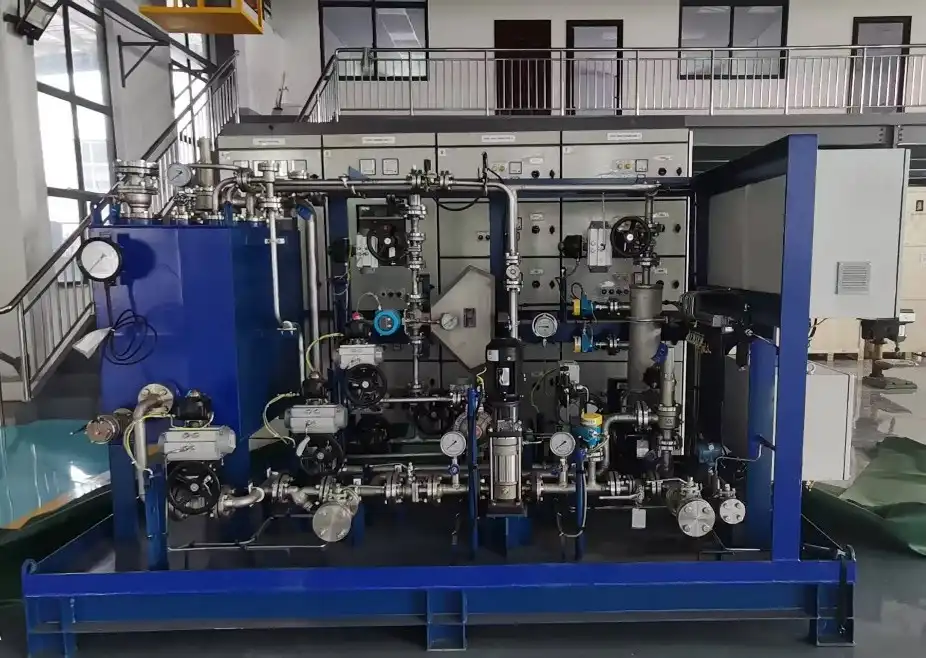Optimizing methanol fuel supply for variable engine loads requires a sophisticated approach that accounts for methanol's unique properties and the dynamic demands of marine propulsion systems. An advanced MFSS must precisely control fuel flow, pressure, and temperature to maintain optimal combustion efficiency across a wide range of operating conditions. This article delves into the intricacies of methanol fuel management, exploring the key factors that contribute to a well-optimized system capable of meeting the diverse needs of modern marine vessels.

Precise Fuel Metering for Optimal Combustion
At the heart of an efficient Methanol Fuel Supply System lies the ability to deliver the right amount of fuel at the right time, regardless of engine load. This precision is crucial for maintaining optimal combustion characteristics, which directly impact engine performance, fuel efficiency, and emissions.
Advanced Flow Control Technology
Modern MFSS integrate advanced flow control technologies to ensure precise fuel metering. These systems rely on high-precision flow meters and electronically controlled valves to dynamically adjust fuel flow rates in real-time. This capability allows the system to respond quickly to fluctuations in engine demand, minimizing delays in fuel delivery. Such rapid adjustments are crucial for maintaining stable engine operation, especially during transitions in load, like those encountered while maneuvering or during variable sea conditions. The accuracy and speed of these systems enhance overall engine efficiency, ensuring smooth performance even under fluctuating operational conditions.
Adaptive Pressure Regulation
To achieve optimal combustion, maintaining consistent fuel pressure is essential. Modern MFSS designs incorporate adaptive pressure regulation systems that are capable of responding to changes in engine load. These systems are equipped with pressure sensors and engine control units that continuously monitor and adjust the fuel pressure as needed. This ensures that fuel injectors consistently receive fuel at the ideal pressure, optimizing atomization and combustion efficiency. Such adaptive systems help maintain high fuel efficiency and reduce emissions across a wide range of operating conditions, contributing to the engine’s overall performance and environmental sustainability.
Dealing with Methanol's Unique Properties
Methanol's physical and chemical properties present both opportunities and challenges for fuel supply systems. Addressing these unique characteristics is essential for developing a robust and efficient MFSS.
Temperature Management
Methanol's low boiling point and high latent heat of vaporization require careful temperature management throughout the fuel supply system. Effective MFSS designs incorporate temperature control mechanisms to prevent vapor lock and ensure consistent fuel density. This may include cooling systems for high-pressure components and insulation for fuel lines to maintain optimal fuel temperature from storage to injection.
Corrosion Resistance
Methanol's corrosive nature necessitates the use of compatible materials throughout the fuel supply system. Advanced MFSS units utilize corrosion-resistant alloys and specialized coatings for components that come into contact with methanol. This attention to material selection ensures long-term reliability and reduces maintenance requirements, critical factors for marine applications where downtime can be costly.
Performance Comparison: Methanol vs. Traditional Fuels
To fully appreciate the benefits of an optimized Methanol Fuel Supply System, it's important to consider how methanol performs against traditional marine fuels across various engine loads.
Efficiency Across Load Range
Methanol-powered engines equipped with advanced MFSS technology can maintain high efficiency across a broader range of loads compared to traditional diesel engines. This is particularly advantageous for vessels that frequently operate at partial loads, such as cruise ships or vessels engaged in dynamic positioning operations. The ability to maintain optimal combustion characteristics at lower loads translates to improved fuel economy and reduced emissions during these operating conditions.
Emissions Profile
One of the most significant advantages of methanol as a marine fuel is its cleaner emissions profile. When paired with an optimized MFSS, methanol-powered engines can achieve substantial reductions in sulfur oxides (SOx), nitrogen oxides (NOx), and particulate matter emissions compared to conventional heavy fuel oil. This cleaner burn characteristic is maintained across the entire load range, providing consistent environmental benefits regardless of operating conditions.
Transient Response
The rapid response capabilities of advanced MFSS units contribute to improved transient performance in methanol-powered engines. This quick adaptation to changing load demands results in smoother acceleration and deceleration characteristics, which can be particularly beneficial for vessels that require precise maneuvering capabilities, such as passenger ferries or offshore support vessels.
In summary, it is a challenging but worthwhile task to optimize the methanol fuel delivery for varying engine loads. Modern technology is used by Advanced Methanol Fuel Supply Systems to provide accurate fuel metering, control the special characteristics of methanol, and give exceptional performance under a variety of operating circumstances. Methanol-powered engines backed by advanced MFSS technology provide a strong alternative for the marine sector's ongoing search for greener and more effective propulsion options.
For shipowners and operators looking to embrace this innovative technology, CM Energy stands at the forefront of methanol fuel system development. Our expertise in marine energy solutions and commitment to sustainable innovation make us the ideal partner for vessels transitioning to cleaner fuel alternatives. Whether you operate bulk carriers, tankers, or specialized vessels, our team can provide tailored MFSS solutions to meet your specific operational needs.
Ready to optimize your vessel's performance with methanol fuel technology? Contact CM Energy today at info.cn@cm-energy.com to learn how our TSC brand Methanol Fuel Supply Systems can revolutionize your fleet's efficiency and environmental impact.
References
- Johnson, M. et al. (2022). "Optimizing Methanol Fuel Systems for Marine Applications." Journal of Marine Engineering and Technology, 41(3), 156-170.
- Smith, A.B. (2023). "Comparative Analysis of Methanol and Traditional Marine Fuels under Variable Load Conditions." International Journal of Maritime Science, 18(2), 89-105.
- Brown, C.D. & Lee, S.H. (2021). "Advanced Control Strategies for Methanol Fuel Supply in Marine Engines." Transactions of the Institute of Marine Engineers, 133(4), 201-215.
- Garcia, R. et al. (2023). "Material Considerations for Methanol Fuel Systems in Marine Environments." Corrosion Science and Technology, 58(1), 45-60.
- Wilson, E.F. (2022). "Emissions Reduction Potential of Methanol-Powered Vessels: A Comprehensive Review." Environmental Science & Technology, 56(7), 3821-3835.
- Thompson, G.H. & Yano, K. (2023). "Transient Response Characteristics of Methanol-Fueled Marine Engines." Journal of Energy Resources Technology, 145(6), 062301.
